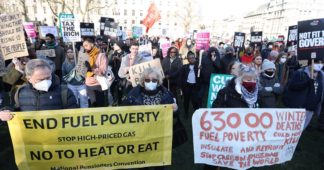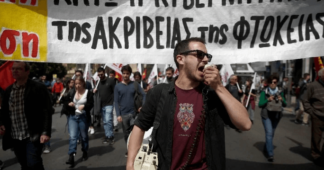Inflation is expected to reach an eye-watering 9.1 per cent, yet the head of the Bank of England’s says people shouldn’t ask for a pay rise.
May 17, 2022
WAGES have plummeted to the lowest level in more than a decade as they fall behind rocketing inflation, which unions warned today could spell disaster for many working people.
Regular pay excluding bonuses dropped by 2.9 per cent in March when taking Consumer Prices Index (CPI) inflation into account — the biggest fall since November 2011, the Office for National Statistics (ONS) said.
In the three months to February, real regular pay was 2 per cent lower, the steepest decline since 2013.
Pay has been failing to keep up with inflation for some months, despite strong earnings growth, and official data released today is expected to show another eye-watering rise — 9.1 per cent in April — in the cost of living as last month’s hike in the energy price cap is reflected.
It comes after Bank of England governor Andrew Bailey said that workers should “think and reflect” before asking for a pay rise to avoid fuelling further inflation.
The bank’s boss, who was paid £575,000 in the latest financial year, said: “I was asked if I have taken a pay rise myself this year and I said no, I had asked the Bank not to give me one, because I felt that was the right thing for me personally.”
GMB union general secretary Gary Smith said: “Pay dropping at the same time as inflation runs rampant could spell disaster for too many working people.
“Real wages have suffered their biggest drop for a decade, yet the Bank of England’s boss still thinks people shouldn’t ask for a pay rise.”
Mr Smith said that the best way to get wages rising is to empower trade unions.
He called for urgent action from the government to help people with the cost-of-living crisis.
TSSA general secretary Manuel Cortes said that the transport union would not “sit idly by as the Tories’ cost-of-living crisis hits our members in their pockets,” and threatened industrial action.
He said: “Many of our members have not seen a pay increase for two years and with prices rocketing, enough is enough.
“If the Department for Transport, Train Operating Companies and Network Rail don’t come forward very soon with proposed pay increases which at least match inflation, a summer of discontent is on the way across our railways.”
TUC deputy general secretary Paul Nowak said: “It is unbelievable that the bank has repeated its calls for workers to take a wage hit while saying virtually nothing about soaring profits at the likes of BP and Shell.”
He said that the last thing working people need in the middle of the worst living standards crisis in generations is to have their wages held down.
“Let’s be crystal clear: global energy prices are driving up inflation, not pay claims,” Mr Nowak said.
“Suppressing pay will suck demand out of our economy and cause widespread hardship.”
Labour shadow work and pensions secretary Jonathan Ashworth warned that people in Britain were facing a “cost-of-living tsunami,” with real wages now almost £300 lower than they were 15 years ago.
He said: “By refusing to take action on the cost of living through an emergency budget, Rishi Sunak has shown once again the Tories simply aren’t on the side of working people.”
The Chancellor, who has so far resisted intensifying pressure to provide extra help, said: “I understand that these are anxious times for people, but it’s reassuring that fewer people are out of work than was previously feared.”
Mr Sunak was referring to the ONS data which also showed that the rate of unemployment dropped to 3.7 per cent in the three months to March, the lowest since between October and December 1974.
For the first time, there were fewer unemployed people than vacancies as job openings hit a record 1.3 million.
But the fall in the rate — down from 3.8 per cent in the three months to February — was also due to a rise in the number of people dropping out of the jobs market, the figures showed.
The bank warned earlier this month that the cost crunch is set to leave Britain on the brink of recession, forecasting that inflation will peak at more than 10 per cent later this year.
On Monday, Mr Bailey also issued an “apocalyptic” warning about rising food prices and policymakers have said unemployment will start to rise as the crisis deepens, with the rate set to rise back up to about 5.5 per cent.
We remind our readers that publication of articles on our site does not mean that we agree with what is written. Our policy is to publish anything which we consider of interest, so as to assist our readers in forming their opinions. Sometimes we even publish articles with which we totally disagree, since we believe it is important for our readers to be informed on as wide a spectrum of views as possible.











